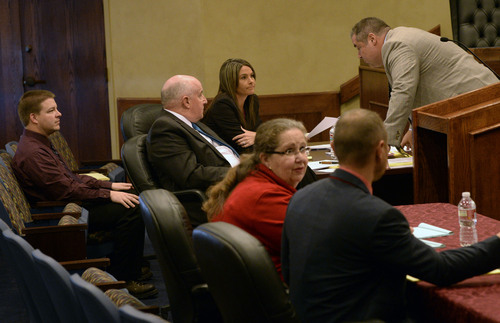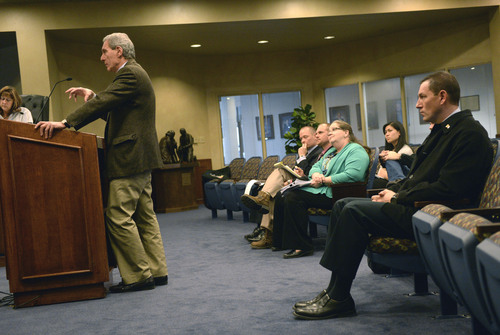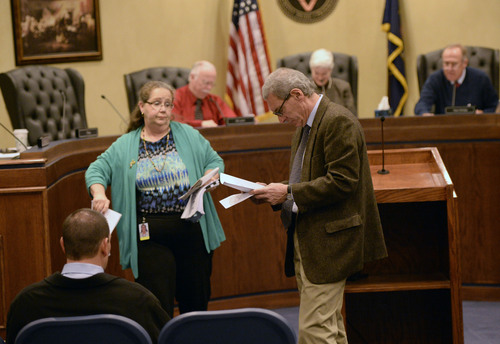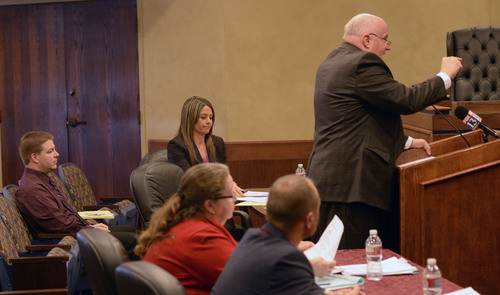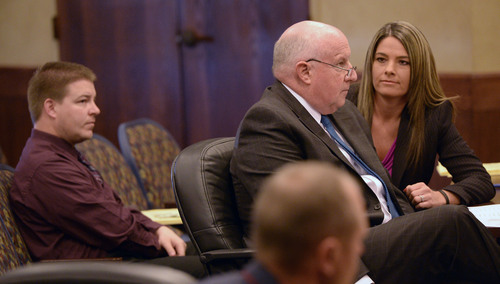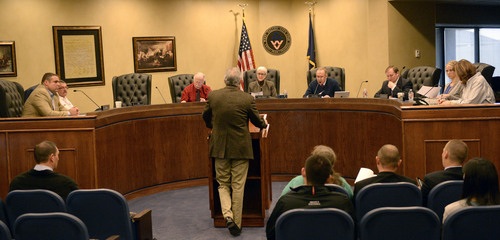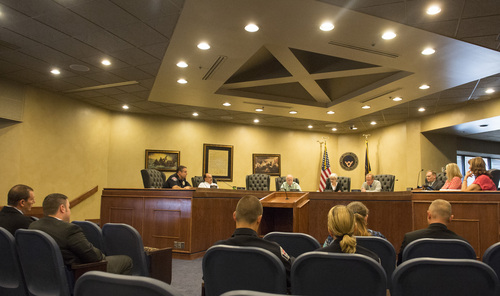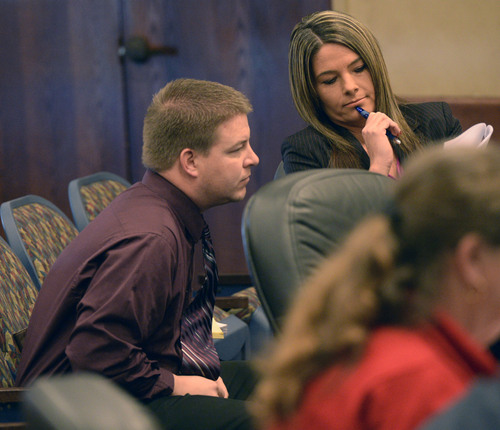This is an archived article that was published on sltrib.com in 2014, and information in the article may be outdated. It is provided only for personal research purposes and may not be reprinted.
West Valley City • For more than 30 years, the West Valley City Civil Service Commission has ruled on job-action appeals from police and firefighters.
But now — just two months after the three-member panel handed the city a major upset and in the middle of its investigation of fired police Officer Shaun Cowley, who faces a separate criminal charge in the shooting death of Danielle Willard — the city may disband the commission.
City Council members discussed the possibility of replacing the commission and the separate employee appeals board for civilian city merit employees with a hearing officer earlier this week and set a vote on the matter for Tuesday. City officials say the proposal is about increased efficiency and has nothing to do with the two police department appeals.
Keith Stoney, Cowley's attorney, says while the move likely wouldn't disrupt anything for his client's wrongful-firing case, the potential switch seems "suspect" because of the timing. He believes it may be because of the way the commission decided police Lt. John Coyle's case in May — overturning his demotion by the West Valley City Police Department.
Coyle oversaw the department's troubled neighborhood narcotics unit, which later was disbanded. An investigation into the unit after the Nov. 2, 2012, shooting of Willard in the course of a drug probe, found multiple violations of evidence-handling policies. Coyle was demoted and reassigned as a rank-and-file officer for failing in his leadership role.
The commission ordered him reinstated May 15 with back pay. He was returned to lieutenant rank, this time in the records department.
"They probably didn't get the decision they wanted on the Coyle matter," Stoney said. "It does give the appearance that they're not happy campers, so they're going to change it."
In a criminal case separate from the appeal of his dismissal, Cowley faces a manslaughter charge in the death of Willard, who was unarmed when she was shot to death, though Cowley has said he feared being struck by her car. By the time the criminal case was lodged June 19, he had been fired from the police force on allegations of mishandling evidence.
His appeal hearing before the Civil Service Commission has been delayed five times, with a new date now set for late August.
—
Timing a coincidence • Eric Bunderson, West Valley City attorney, says consideration of disbanding the Civil Service Commission is unrelated to the Cowley case. Conversations about the change began as early as 2011, he said.
"We had been planning to do this for months and months and didn't feel like we could wait any longer," Bunderson told the council. "There's a potential that there's always going to be a case in the works."
He said the commission has challenges that likely could be handled more quickly and efficiently by one person acting as an administrative law judge than by a multi-member committee.
The Coyle decision took about five months, which was considerably longer than Bunderson expected. He hopes a hearing officer could cut that time in half.
The three members of the current Civil Service Commission are residents appointed by the city manager and paid a small stipend to review promotions, overlook departmental transfers and hear employee appeals as needed. Merit civilian employees have a similar appeals process before another three-member board.
Bunderson said because three people have such different opinions, it's hard to come to a timely decision. The city also has to hire an outside adviser to counsel the commission when an appeal does come up, which he says is expensive.
If the City Council decides to move forward with dissolving the commission, most of the panel's functions would shift to the city's human-resource department. A hearing officer's job would consist solely of hearing and ruling on appeals for an estimated 500 merit employees, including police officers and firefighters, among other staff.
—
Checks and balances • Councilman Corey Rushton worries there are insufficient checks and balances with using a hearing officer.
"The good thing with juries," he said, "is that you get a totally impartial view of lay citizens and residents."
Rushton believes the council will vote to "retool" the commission in some way, but hopes the final resolution will ensure "political science 101" fairness. He wants the hearing officer to be able to act independently and impartially.
Ray Wickens, president of Utah's branch of the American Federation of State, County and Municipal Employees, says it is impossible to safeguard against bias if there is only one hearing officer making the decisions. He argues the change under discussion would "weaken" the protection of city workers.
"Just a hearing officer can be a biased person. We really have no control over them, and they can do what they want," Wickens said. "One person without a strong set of rules behind them can be swayed. There is politics."
Wickens and Rushton are concerned city officials could have too much influence on the hearing officer, because, at the end of the day, they would cut his or her paycheck.
Bunderson disagrees and says the city code guarantees the officer's independence. The city couldn't change a decision it disagreed with, nor could it fire or reprimand the hearing officer so long as the officer followed the law.
If the resolution to dissolve the commission passes, the city manager hopes to hire an applicant with a strong legal background.
Bunderson says the proposal isn't about Cowley or Coyle — nor is it about potential cost savings.
"What we want, frankly, is an answer," Bunderson said. "What we want is the opinion one way or another so we can move on with what we need to do. … It's more of an efficiency thing than an inadequacy thing."


